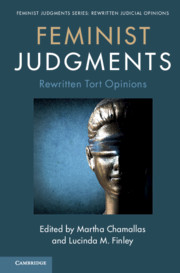Book contents
- feminist judgments: rewritten tort opinions
- Feminist Judgments Series Editors
- Feminist Judgments: Rewritten Tort Opinions
- Copyright page
- Contents
- Notes on Contributors
- Preface
- Table of Cases
- Part I Introduction
- Part II The Classics
- Part III Intentional Torts
- Part IV Negligence and Vicarious Liability
- 10 Commentary on Sharon P. v. Arman, Ltd.
- 11 Commentary on Broadnax v. Gonzalez
- 12 Commentary on Boyles v. Kerr
- 13 Commentary on Emerson v. Magendantz
- 14 Commentary on McCarty v. Pheasant Run
- 15 Commentary on Lisa M. v. Henry Mayo Newhall Memorial Hospital
- Part V Damages
- Index
11 - Commentary on Broadnax v. Gonzalez
from Part IV - Negligence and Vicarious Liability
Published online by Cambridge University Press: 28 November 2020
- feminist judgments: rewritten tort opinions
- Feminist Judgments Series Editors
- Feminist Judgments: Rewritten Tort Opinions
- Copyright page
- Contents
- Notes on Contributors
- Preface
- Table of Cases
- Part I Introduction
- Part II The Classics
- Part III Intentional Torts
- Part IV Negligence and Vicarious Liability
- 10 Commentary on Sharon P. v. Arman, Ltd.
- 11 Commentary on Broadnax v. Gonzalez
- 12 Commentary on Boyles v. Kerr
- 13 Commentary on Emerson v. Magendantz
- 14 Commentary on McCarty v. Pheasant Run
- 15 Commentary on Lisa M. v. Henry Mayo Newhall Memorial Hospital
- Part V Damages
- Index
Summary
In Broadnax v. Gonzalez the court overruled precedent that denied pregnant women tort recovery when negligent prenatal care caused miscarriage or stillbirth. The decision held that doctors owe a direct duty of care to the pregnant patient that permits her to recover for the emotional harm from pregnancy loss. The rewritten feminist opinion comes to the same conclusion, but more thoroughly critiques the prior cases as treating women as separate from their fetuses, virtual bystanders to their own bodies. It also concludes that miscarriage or stillbirth harms women physically, not just emotionally, and that tort law should treat these cases like any other medical malpractice case. The accompanying commentary explores the conflicting ways courts have categorized women’s harm to limit recovery for prenatal malpractice, and argues that greater attention to women’s experience of pregnancy complications and harm loss would improve both medical outcomes and the gender equity of tort law.
Keywords
- Type
- Chapter
- Information
- Feminist Judgments: Rewritten Tort Opinions , pp. 237 - 260Publisher: Cambridge University PressPrint publication year: 2020

